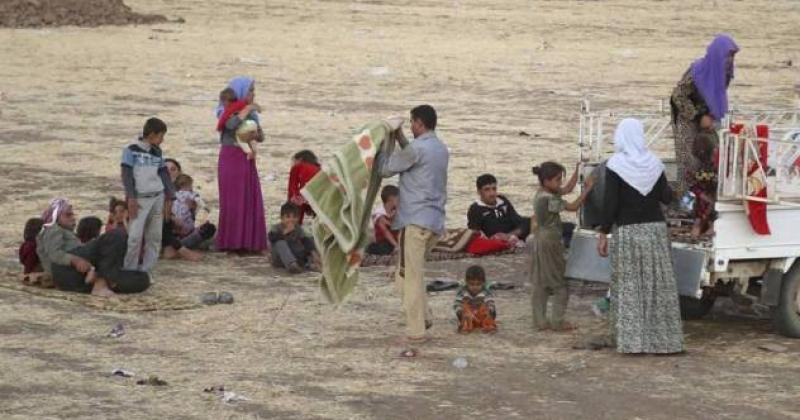Just as "commander-in-chief", Barack Obama, addressed the US and the world, announcing the imminent launch of a “long and complex” military campaign against the jihadists and the Islamic Caliphate in Iraq and Syria.
The patriarchs of five Eastern Churches,that have strong roots in the Middle Eastern region and history, were also in Washington, not far from the White House. They were guests of honour at the inaugural summit organized by the association In Defence of Christians. A three-day meeting featuring gala dinners and declarations aimed at encouraging intervention on the part of Western governments and institutions tasked with defending Christians who are being threatened and affected by Islamist upheaval in the Middle East. Obama took time out of his busy schedule of commitments for the commemoration of the September 11 attacks 13 years ago to receive the five patriarchs in the white House and hold a 40 minute conversation with them.
Whether it was planned or just a coincidence, the choreography was a success: while the Middle Eastern Christian leaders were putting pressure on the White House--a lobbying push on Capitol Hill” as The Washington Post puts it--o defend Christians who are being attacked by Islamic militants in the Middle East, the leader of the most powerful Western nation okayed further raids and gave the go ahead for new troops to annihilate groups of cutthroats handling weapons supplied by the US, gather funds from Gulf nations that are “friends” of the US and fish for followers in the heart of Europe, finding manpower among the ranks of Kosovo nationalists who took advantage of NATO’s bombing of Serbia back in the 1990s.
The presence of the patriarchs representing the Eastern Churches at the North Atlantic summit seems to confirm an increasingly prominent phenomenon: in the midst of the conflicts and sectarian violence that are tearing the Middle East apart, the issue of the defence and protection of Christians has been causing geopolitical disagreement. A number of players are trying to play out their geopolitical strategies against this backdrop.
In Defence of Christians is a relatively recent creation, introduced by US political and cultural circles in order to show their solidarity towards Middle Eastern Christians. It was established less than two years ago as a pressure network that aimed to unite politicians, diplomats, activists and influential members of Christian communities in diaspora in the US. The declared objective was to influence the US and foreign governments to adopt policies that will safeguard and empower minority religious communities in the Middle East.” The organisation’s mission is “to heighten awareness among policymakers” and especially to influence US foreign policy, changing the conditions under which the US government helps regimes that persecute Christians, as is the case in Pakistan and Egypt. But it is not just North Atlantic circles that are taking a stand to defend Christians. Putin’s government is working with the Patriarchate of Moscow to reassert itself as the protector of Christians. It did so in the context of the Syrian conflict when the US, France and Britain supported the anti-Assad rebels who had already been infiltrated by jihadists.
On last year’s anniversary of the September 11 attacks, Moscow’s Patriarch Kirill wrote a letter to Barack Obama, asking the president to listen to the cries of religious leaders who unanimously opposed the proposed invasion of Syria by Western forces to overthrow Assad. In his message, the patriarch warned of “the threat of total extermination or banishment” which hung like a dark cloud over the heads of Christians in the Middle East. A day or so ago, a section of the Imperial Orthodox Palestine Society was opened in Nazareth. It was founded during the Tsarist era as an instrument of Russo-Orthodox activism in the Holy Land and revived after the Soviet era. “The Holy Land has always been important for the Russian Orthodox. We want to try to recover as much as possible our properties, and especially to resume our school activities. If before we help the Orthodox, now we want to help all Christians in the Holy Land and the Middle East and the entire population,” the Society’s president, Sergey Stepashin said.
In Israel too, the campaigns backed by Israeli Member of Parliament Yariv Levin, proposed legislative measures that introduced positive discrimination that was more favourable to Palestinian Christians than Muslim Palestinians. Meanwhile, the Greek Orthodox priest Gabriel Naddaf and some Israeli politicians backed the idea of extending obligatory military service in Israel to Arab Christian citizens to ensure unified resistance and defence of Christians and Jews against Islamist fundamentalism. In line with the neo-Ottomanist aspirations of the current Turkish leadership, Turkey is also trying to present itself as a homeland for the many Syriac Christians (Chaldeans, Syrians, Assyrians) residing in Syria and Europe, whose ancestors once lived in Turkish territory. Turkey’s Prime Minister, Recep Tayyip Erdoğan, invited Syriac Christian emigrants to return to Turkey. Meanwhile, in Jordan, King Abdullah II has taken a number of concrete actions to reassert his role as an Islamic Monarch who is committed to supporting a global plan for the protection of native Middle Eastern Christian communities.
The Holy See has reacted to the many proposals made by geopolitical players who are willing to embrace the Christian cause, with traditional realism, continuing to endorse everyone’s good intentions, whilst steering itself away from any attempts at manipulation. The Prefect of the Congregation for Eastern Churches, Cardinal Leonardo Sandri, spoke about the results of this realist approach at the Washington meeting. To understand the cause of the unrest that is bringing death and desperation to the Middle East, more than worn-out slogans on the “clash of civilizations”, the focus needs to turn to the “vast economic interests at stake”: "the trading of arms, the control of oil wells and of gas deposits.” This may be the only real way of stopping the aggressor.
